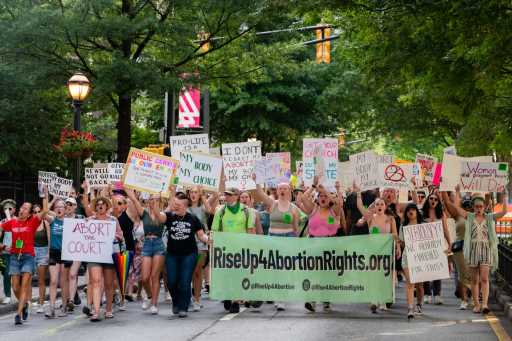Georgia Supreme Court Reinstates Ban On Abortions After 6 Weeks — Update
UPDATED: The Georgia Supreme Court revived the state’s restrictive abortion law Wednesday, again banning abortions after six weeks of pregnancy, at least temporarily.
In its ruling, the high court put a lower court order that declared the ban unlawful on hold while the case is appealed, requiring abortion providers to again stop performing the procedure past six weeks into the pregnancy.
Fulton County Superior Court Judge Robert McBurney ruled on November 15 the six-week ban was unlawful because it was enacted in 2019, when abortion was still legal nationwide under Roe v. Wade.
Georgia’s ban took effect in July, after the U.S. Supreme Court overturned Roe v. Wade.
Abortion rights advocates and physicians sued to overturn the law in July after a federal appeals court allowed it to take effect, arguing that the law was unconstitutional.
Related Story
Alliance For Creativity And Entertainment Expands Membership With Cavea Plus
PREVIOUS, July 20: A federal appeals court ruled today that Georgia’s restrictive 2019 abortion law should be allowed to take effect, overruling a lower court.
The three-judge panel of the 11th U.S. Circuit Court of Appeals said the recent U.S. Supreme Court ruling in a Mississippi case that overturned Roe v. Wade and returned abortion law to the states, “makes clear no right to abortion exists under the Constitution, so Georgia may prohibit them.”
The law in Georgia — a massive film and television production hub — bans most abortions when there’s a detectable human heartbeat, which can be as early as six weeks, before women know they are pregnant. It has exceptions for rape and incest if a police report is filed, if the mother’s life is at risk, or the fetus is medically unviable.
The appeals court also rejected arguments that an unusual “personhood” provision that’s part of the law is unconstitutionally vague. It gives a fetus the same legal rights as everyone else with far-reaching implications and is also outside the purview of both Roe v. Wade, and of the recent Supreme Court ruling overturning it. Some observers had thought it might be decoupled from the broader law.
The ACLU of Georgia said “the court took this action on its own, without any request from the state, and outside of the normal court procedures.”
The organization, with the Center for Reproductive Rights, Planned Parenthood Southeast and Planned Parenthood Federation of America said in a joint statement: “This is a highly unorthodox action that will immediately push essential abortion care out of reach for patients beyond the earliest stages of pregnancy. Across the state, providers are now being forced to turn away patients who thought they would be able to access abortion, immediately changing the course of their lives and futures. This is horrific. We’ll continue doing everything in our power to fight for abortion access in Georgia in the face of these harmful attacks on people’s ability to control if and when to have a child.”
The decision does not take effect until the court’s official mandate is issued, typically 28 days after an appellate decision. Until then, abortion remains legal in the state.
With abortion now in the hands of state lawmakers, “Georgia voters have the opportunity to vote out politicians who oppose a woman’s right to decide when, whether, and with whom she wants to have a family,” added Andrea Young, executive director of the ACLU of Georgia.
The Georgia law was signed by Gov. Brian Kemp, currently running against Stacey Abrams, whom he narrowly beat in 2018. She has called for a legislative solution to restore nationwide access to abortion.
The signing prompted an immediate outcry from Hollywood and threats from producers from Disney to Netflix on pulling out of the state if it ever went into effect. It never did. Reproductive rights groups and the ACLU sued and a district court judge granted an injunction and ultimately struck it down, ruling in July of 2020 that it was unconstitutional.
It was appealed then but last September the appeals court issued a stay in its review of the pending the Supreme Court decision on the Mississippi case, called Dobbs V Jackson Women’s Health Organization. The Court ruled on that June 24, finding “that the right to abortion is not deeply rooted in the Nation’s history and tradition.”
With restrictive abortion laws passed, pending or in legal limbo in nearly half of U.S. states, the entertainment industry faces a challenge that’s broader than Georgia, although no other state besides California has the production capacity and infrastructure. It was lured there over the last decade by major tax credits.
“What do you do, all of a sudden? In the office, I have color-coded states that have some sort of legislation, and tax credits, and it pretty much overlapped,” said one Georgia-based accountant.
Major studios didn’t weighed in on the Supreme Court ruling but did move to expand employees’ health benefits to include covering travel out of state for an abortion.
Must Read Stories
Disney’s ‘Strange World’ Sees $800K In Previews As ‘Wakanda Forever’ Tops $300M
Apple Near Deal For Rights To Michael Lewis Book About Fallen Crypto King Bankman-Fried & FTX
Strike Watch: Would WGA Build Coalition With DGA & SAG-AFTRA For Contract Talks?
Quentin Tarantino Comes Of Age During Era Of Auteur ’70s Pics: The Deadline Q&A
Read More About:
Source: Read Full Article





